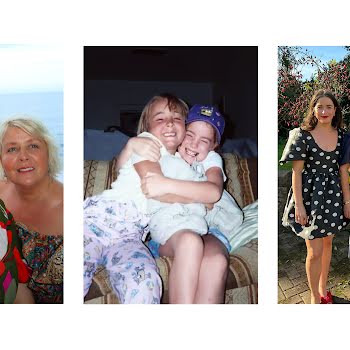
How to cope through loss and grief, according to a psychologist who knows all too well
By IMAGE
21st Feb 2024
21st Feb 2024
Read time: 5 minutes
Psychologist and author Niamh Fitzpatrick knows only too well about loss and grief. Here, from the IMAGE 2020/2021 Annual, she shares her mental health strategies, for when life isn’t what we expected.
In the same way that we need to mind our physical health, we also need to mind our mental health.
Every now and then, we encounter junctures in life where there’s a heightened need, that extra layer of importance around looking after body and mind. We’re living in such times now. It’s safe to say that March 2020 brought troubled times to the world, and we’re living through a period repeatedly described as “unprecedented”. To coin that other well-worn phrase, we’re living in “the new normal”. Although there’s nothing about the way we currently live that’s normal because life now bears little relation to the way life used to be. For now, at least, that old life is gone, and in order to keep ourselves and each other safe, we have to adapt to this new way of living and being.
That feeling of leaving an old life behind and having to adapt to a new one is familiar to me. On March 14, 2017, my sister Dara was killed in a helicopter crash while on a search and rescue mission. Life as I knew it ended overnight. Without warning. No chance to even say goodbye to the girl who had been my sister for 45 years. Quite simply, life was divided into two halves: life before Dara died and life after Dara died. My old life and my new life.
Advertisement
Adding to the shock and the sadness, my marriage ended around the same time that Dara died, and I found myself reeling under the weight of cumulative loss. They were troubled times, and it often felt like a bad dream; I hoped I would wake to find that normal life had resumed. Only it wasn’t a bad dream, it was a living nightmare. Three-and-a-half years on from Dara’s death, I have survived. I’ve accepted her loss and have learned to balance remembering my sister and living my life.
You could say that I’ve come out of the bunker where grief holds us captive in those early times after loss. That’s important to know. Because we can survive even these hardest of times in life. As humans, we have immense capacity to accept, adapt, adjust – and come through life’s difficulties.
We can survive even these hardest times. As humans, we have immense capacity to accept, adapt, adjust and come through.
So how can we help ourselves when events challenge us mentally, emotionally, physically, financially and socially? Health concerns, financial worries, relationship difficulties, bereavement, pressure to perform at work, family issues: myriad ways that life can push us to our limits, placing strain on our mental and emotional health, not least when during a pandemic, when we’re already pushed to the pin of our collar. Having strategies to help you “mind your mind” is vital at all times, but perhaps it’s even more necessary these days.
Here are some strategies to help you cope in difficult times…
Advertisement
NAME IT
It’s vital to name how you feel and to place context on those feelings. So, it might be: “I feel stressed because we’re fighting all the time.” Or “I feel anxious because money is so tight.”
TAKE A BREATH
Advertisement
Breathe in through your nose for a count of four, exhale slowly for a count of eight; do this a few times. It will bring a pause to the panic and allow you to think clearly – a vital tool in difficult times.
FEEL THE FEELINGS
Acknowledge the feelings – don’t try to ignore them, run from them, or mask them. Strong emotional states are normal responses to challenging times, so accept that how you feel is normal and allow yourself to feel what you feel without judgement. As Austrian psychiatrist and Holocaust survivor Viktor Frankl once said, “An abnormal reaction to an abnormal situation is normal behaviour.”
DON’T LET YOUR MIND GO DOWN THE RABBIT HOLE
When those really difficult times arrive in life, our minds can run on ahead and we think of all the “what if?” scenarios, wondering how it’s all going to work out. Unless we do this in a conscious way, it’s rarely helpful because we so often catastrophise and assume that the worst-case scenario is the only possible outcome. So, stay in the present and deal only with the facts of what is right in front of you.
WHAT WOULD HELP?
Advertisement
We can sometimes tend to focus on the problem rather than on sourcing a solution. So even if it feels like an impossible situation, ask yourself, “What would help make this even a little better?” This shifts attention towards what’s useful and can often unlock a course of action that can be of great help.
CONTROL THE CONTROLLABLES
Lots of things in life are out of our control, and it’s important to consider the elements of your situation that are within your control, and focus your attention and efforts on them, rather than on factors that are outside of your influence.
CHUNK IT DOWN
It can be quite overwhelming trying to come to terms with challenging times in life, but it’s useful to chunk things down and not try to deal with too much at once. Take things one day at a time, look at the challenge ahead of you in small chunks, and deal with each chunk one at a time.
PRIORITISE SELF-CARE
Advertisement
Rest, sleep, hydration, good nutrition, fresh air, gentle movement, and connection with loved ones are so important. Find something to occupy you, and avoid toxic people and unnecessary tasks.
TAKE A BREAK
Even momentary breaks from the worry of your situation can be beneficial. Think of little things that will give you little breaks, such as wrapping up warm and getting some fresh air, reading a book, soaking in a warm bath, watching a favourite film, having a cup of tea in front of the fire, or chatting to a friend on the phone. These won’t solve your worries, but they can help sustain you as you navigate them.
GATHER SUPPORT
Many of us have people in our lives who want to help when we’re going through bereavement, redundancy, illness, or other big life challenges. The giving and receiving of that support can bring benefit to all parties, so think about who might be offering help that you have not yet accepted and consider whether it might be time to do so.
GET PROFESSIONAL HELP IF NEEDED
Advertisement
For many people, the hard times in life will not require professional help. Sometimes, however, a qualified and experienced ear can be hugely beneficial when it comes to finding your way through times of difficulty. There is no shame in this; indeed, it’s a strength to recognise when it would be useful to look for guidance in navigating the lows in life.
IF YOU CAN’T MAKE IT BETTER, AT LEAST DON’T MAKE IT WORSE
On my last birthday before Dara died, I got annoyed about something and I never saw her that day. I cannot fix that, but I can make it worse by going over and over it in my head and wishing that I had made a different choice that day. As I cannot make it better, my job is to at least not make it worse, so I focus on the days that we did have together, rather than focusing my attention on the one day that I regret but cannot change. Don’t make a difficult situation worse with a focus of attention on things that you cannot change.
5 THINGS TO REMEMBER IN TIMES LIKE THESE
• Be kind to yourself
• Don’t expect to feel or behave as normal
• Don’t compare yourself to others
• Don’t expect to get through it on your own – getting help is okay
• Allow yourself to stumble, fall, fail, mess up and then get back up and keep going
Tell Me the Truth About Loss by Niamh Fitzpatrick (Gill Books, €16.99) is out now.
Advertisement

“Diva”, coloured etching, by Stephen Lawlor, SO Fine Art Editions, sofinearteditions.com.
This article originally appeared in the IMAGE 2020/2021 Annual issue.
Advertisement























